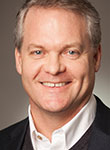Charter Day panelist preview: economist Christopher Barrett
Register for Charter Day
Charter Day: A Festival of Ideas and Imagination, part of Cornell’s sesquicentennial celebration, runs April 24-27. For event details and registration visit http://150.cornell.edu/charterday.
Economist Christopher Barrett has assembled a panel of experts for Charter Day: A Festival of Ideas and Imagination. The panel, “Cornell and Global Poverty Reduction: Philanthropy, Policy and Scholarship,” will be held Saturday, April 25, 3 to 4:30 p.m. at Alice Statler Auditorium.
Tell us about the panel and presenters.
The panel is intended to celebrate Cornell’s long-standing engagement in global poverty reduction, highlight some of the major contributions Cornellians have made over the years and also help inspire current students and alums to engage.

The keynote address will be given by Kaushik Basu, chief economist for the World Bank and Cornell’s C. Marks Professor of International Studies and professor of economics. He has served as lead adviser to the finance and prime ministers of India and is heavily involved in designing economic policy to help rapidly reduce poverty. Richard Stearns ’73 is the president of World Vision US, one of the largest nongovernmental organizations addressing childhood poverty. Eleni Gabre-Madhin ’86 created a commodities exchange in Ethiopia so farmers can have a better sense of prevailing prices and improve their profitability, and she’s now helping establish commodity exchanges across Africa. Debraj Ray, M.A. ’81, Ph.D. ’83 is a celebrated economic theorist who works on poverty and development issues and edits the leading journal in economics.
The final speaker is Erik Thorbecke, a Cornell professor emeritus. The main measure for calculating how many people are poor is called the Foster-Greer-Thorbecke, or FGT Measure, named for the method developed here at Cornell by Erik and two of his graduate students. All the workhorse measures of poverty: headcount ratios, the poverty gap – all those measures come out of Cornell research.
We’re going to show a brief video at the close of the event that shows Cornellians actively engaged around the world in activities to try to help reduce poverty. It’s amazingly inspiring. And each person who gets engaged and helps to move one person out of poverty is making a massive contribution.
Where does the Cornell philanthropic tradition come in?
Cornell has this long history of muddy-boots engagement that most of our peer institutions don’t have. Part of this is the College of Agriculture and Life Sciences. That enables us to take the liberal arts disciplines and combine them with very practical, grounded science. That’s something that’s very distinctive about Cornell. We are the only land-grant university that is also Ivy League.
Part of it, too, is the original ethos of Cornell. Cornell was born at a time when the country was emerging from tremendous tumult. We were trying to figure out how to reabsorb soldiers returning from the Civil War into fundamentally agrarian economies, and to deal with problems of disease, macroeconomic shocks and rapid technological change. Cornell was founded as a different sort of university, to not just train an elite cohort of lawyers and doctors and preachers, but to help the country develop and disseminate science so as to navigate effectively through this difficult transition. And the “any person, any study” ethos was always fundamentally very progressive in both senses of the term: We want to facilitate progress, but we also want to have a preferential option for those who are commonly left on the margins of society. So I think there is a lot in the DNA of the institution that has always made Cornell pay more attention to addressing global poverty issues.
What do you imagine a similar panel will address in another 50 or 100 years?
If the world succeeds in this feasible but slightly audacious aspiration that we will end extreme poverty in the next 20 years – then 50 years from now, that will be a kind of quaint historical reflection. And the next challenge will be making sure everybody gets adequate education and childhood healthcare, so that they’ve got an equal opportunity.
Barrett is the David J. Nolan Director of the Charles H. Dyson School of Applied Economics and Management, the Stephen B. and Janice G. Ashley Professor of Applied Economics and Management and International Professor of Agriculture in the Dyson School; a professor of economics in the Department of Economics; and a faculty fellow at the David R. Atkinson Center for a Sustainable Future.
Sue Brightly is the content manager in the Division of Human Resources and Safety Services.
Media Contact
Get Cornell news delivered right to your inbox.
Subscribe